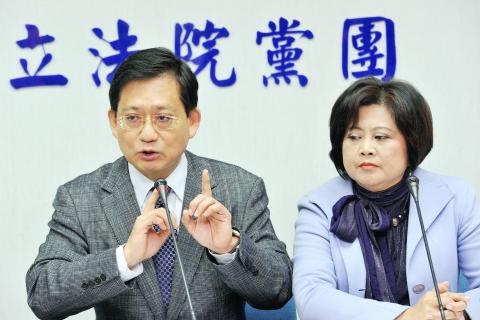Days before the Democratic Progressive Party’s (DPP) planned rally to highlight the issue of media monopolization, Chinese Nationalist Party (KMT) caucus whip Wu Yu-sheng (吳育昇) said yesterday that his caucus would support legislation to address the problem.
Wu told a press conference that the KMT caucus would agree to amendments to the Radio and Television Act (廣播電視法), the Cable Television Act (有線電視法) and the Satellite Broadcasting Act (衛星廣播電視法) proposed by DPP Legislator Yeh Yi-jin (葉宜津) to prevent media monopolies.
Wu’s comment marked a sharp change from the caucus’ previous position.

Photo: Chien Jung-fong, Taipei Times
Public concern about media monopolization has risen after the acquisition of Hong Kong-based Next Media’s four outlets in Taiwan by a consortium that includes the son of pro-China tycoon Tsai Eng-meng (蔡衍明), chairman of the Want Want China Times Group.
The acquisition still has to be approved by the Fair Trade Commission and the National Communications Commission.
The KMT caucus has previously refused to sign a petition by students and civic activists in support of legislation to guard against media monopolies, and boycotted legislative reviews of the amendments proposed by Yeh.
The amendments include a regulation that the number of channels owned by media operators and their related enterprises cannot account for more than one-tenth of all channels.
Wu said the KMT would also support the DPP’s proposal on regulations governing the electronic media and it would suggest that the print media also be covered by anti-media monopolization regulations.
Unlike the DPP, which he said had only focused on the sale of Next Media to the Want Want Group, the KMT opposes all media-monopolization cases, Wu said.
Wu said the caucus had refrained from commenting on the issue before, because it did not want to interfere in the Next Media acquisition.
The three amendments are to be reviewed at the legislature’s Transportation Committee today, with representatives from the Fair Trade Commission attending.

Taiwanese can file complaints with the Tourism Administration to report travel agencies if their activities caused termination of a person’s citizenship, Mainland Affairs Council Minister Chiu Chui-cheng (邱垂正) said yesterday, after a podcaster highlighted a case in which a person’s citizenship was canceled for receiving a single-use Chinese passport to enter Russia. The council is aware of incidents in which people who signed up through Chinese travel agencies for tours of Russia were told they could obtain Russian visas and fast-track border clearance, Chiu told reporters on the sidelines of an event in Taipei. However, the travel agencies actually applied

Japanese footwear brand Onitsuka Tiger today issued a public apology and said it has suspended an employee amid allegations that the staff member discriminated against a Vietnamese customer at its Taipei 101 store. Posting on the social media platform Threads yesterday, a user said that an employee at the store said that “those shoes are very expensive” when her friend, who is a migrant worker from Vietnam, asked for assistance. The employee then ignored her until she asked again, to which she replied: "We don't have a size 37." The post had amassed nearly 26,000 likes and 916 comments as of this

New measures aimed at making Taiwan more attractive to foreign professionals came into effect this month, the National Development Council said yesterday. Among the changes, international students at Taiwanese universities would be able to work in Taiwan without a work permit in the two years after they graduate, explainer materials provided by the council said. In addition, foreign nationals who graduated from one of the world’s top 200 universities within the past five years can also apply for a two-year open work permit. Previously, those graduates would have needed to apply for a work permit using point-based criteria or have a Taiwanese company

The Shilin District Prosecutors’ Office yesterday indicted two Taiwanese and issued a wanted notice for Pete Liu (劉作虎), founder of Shenzhen-based smartphone manufacturer OnePlus Technology Co (萬普拉斯科技), for allegedly contravening the Act Governing Relations Between the People of the Taiwan Area and the Mainland Area (臺灣地區與大陸地區人民關係條例) by poaching 70 engineers in Taiwan. Liu allegedly traveled to Taiwan at the end of 2014 and met with a Taiwanese man surnamed Lin (林) to discuss establishing a mobile software research and development (R&D) team in Taiwan, prosecutors said. Without approval from the government, Lin, following Liu’s instructions, recruited more than 70 software